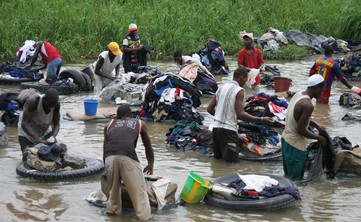What are water-washed diseases?

Water-washed diseases are mainly caused by poor personal hygiene, often a result of a shortage of clean water. Many areas of South Africa are currently experiencing a severe lack of water due to drought. This leads to people having less water, with less opportunities to clean themselves or wash their clothes.
Disease causing microbes are passed from one person to another, through physical contact, sharing bath water or even using the same water to wash clothes over and over. Water-washed diseases include dysentery, scabies (a skin infection that looks like little sores all over) and trachoma (an eye infection that can lead to blindness!).
Wisdom from our clubs!
“Wash your hands
Get rid of germs
use a soap
don’t be scared...”
- Physical ATP (Sobantu Science Club)
Tips on staying healthy!
Water-washed diseases can be easily avoided. The first thing you need to remember is not to re-use water that has already been used to clean yourself or clothes. Definitely don’t drink it! It can be difficult, especially during a drought but personal hygiene is important so find ways to get enough water to clean yourself. Always wash your hands with soap to kill any microbes that you might have picked up and avoid putting your hands into your mouth or near your eyes. Try to clean yourself at least once a day, especially if you have sweated a lot.
Want to learn more about water-washed diseases? Keep a look out for the Hip Hop Health activities and songs being delivered along with the next Spaza Space, to your Science Spaza Clubs. The activities were produced by Science Spaza with support from the Wellcome Trust and you’ll learn all about hygiene and even get to conduct your own research!

